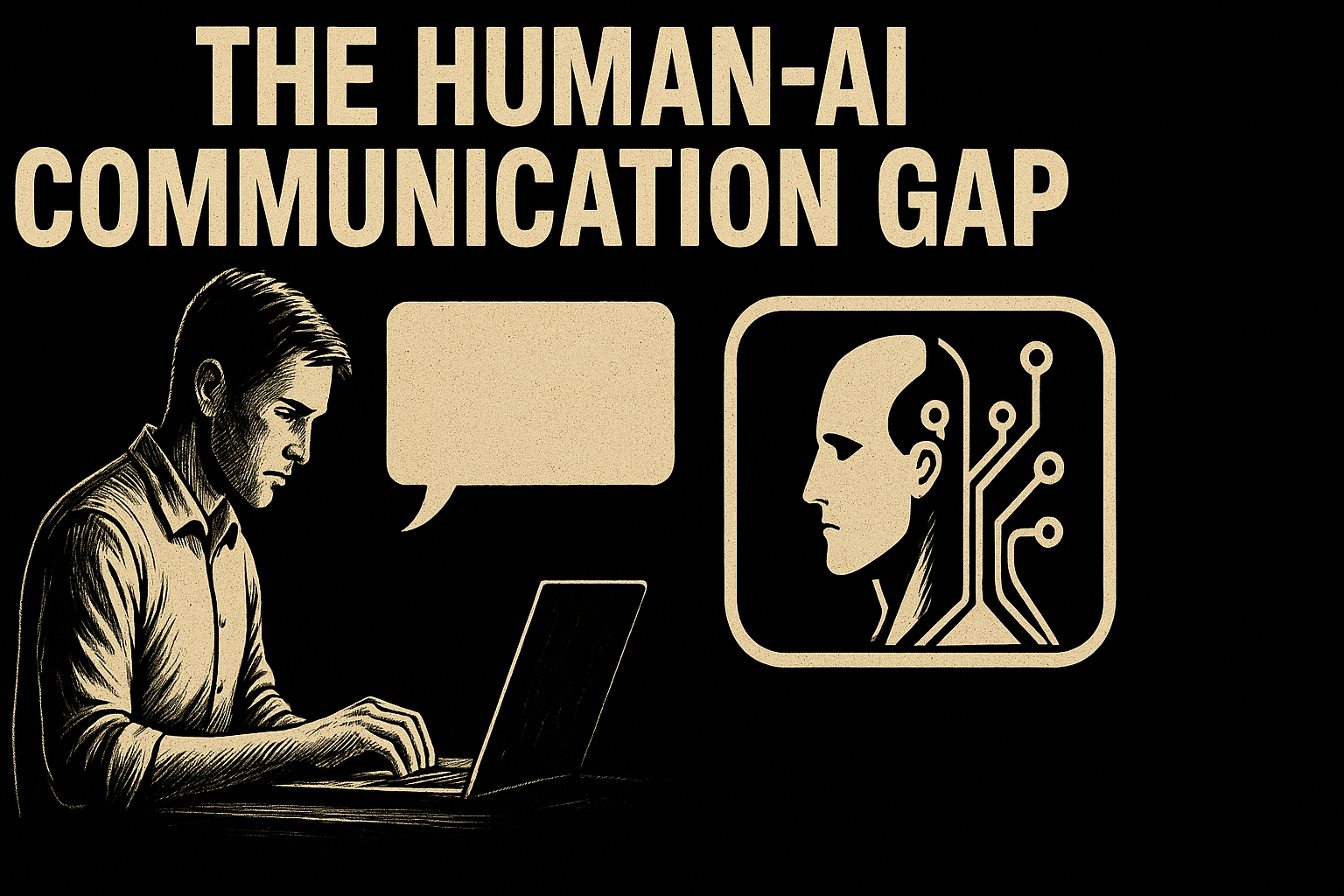
The Art of Conversation: Why Prompting Still Matters in 2025
Despite the hype around prompt engineering dying down, the skill of effective AI prompting remains crucial for business success and personal productivity in 2025.

The Art of Conversation: Why Prompting Still Matters in 2025
The hype around "Prompt Engineer" job titles has died down. LinkedIn isn't flooded with $300K prompt engineer roles anymore, and the tech world has moved on to the next shiny thing.
But here's what hasn't changed: the skill of prompting is more relevant than ever.
Last week, I watched a hiring manager type "create a job description for a Project Manager" into ChatGPT. What came back was textbook perfect and completely useless. Generic responsibilities, standard qualifications, corporate buzzwords that could describe any project manager role at any company in any industry.
The output wasn't wrong. It just wasn't good.
Now imagine if that same hiring manager had said: "Create a job description for a Senior Project Manager at our 200-person healthcare technology startup. We're launching our first AI-powered diagnostic tool, need someone who's managed FDA regulatory processes, can work with both clinical researchers and software engineers, and thrives in ambiguous, fast-moving environments. The role reports to our VP of Product and will manage a cross-functional team of 12."
The difference? Night and day.
One approach treats AI like a Google search bar. The other treats it like a skilled colleague who needs context to do their best work.
This distinction is costing businesses millions in 2025 (and it's only getting more expensive).
The $100 Million Miscommunication Problem
You might wonder if crafting thoughtful prompts still matters when AI capabilities advance daily. The answer is a resounding yes, and the financial stakes have never been higher.
Here's a sobering reality: Despite three-quarters of executives viewing AI as a top strategic priority, only 25% are seeing significant value from their investments. Even more striking? One in three businesses are planning to invest over $25 million on AI in 2025, with 6% planning to spend over $100 million. Yet Forrester's research reveals that global AI decision-makers report positive ROI in just 51% of cases.
The disconnect isn't due to technological limitations. It stems from organizations' inability to communicate with their AI systems effectively.
Think of prompt engineering as the human-AI interface we rely on today. No matter how sophisticated AI becomes, it can't read our minds or grasp our intentions without clear direction. You're essentially having a conversation. But most people are having terrible conversations.
The Individual Advantage You Can't Ignore
The corporate data tells the story, but let's make this personal. When you take time to understand prompt engineering, you're not just improving some abstract business metric. You're transforming your own daily productivity.
Your colleagues are asking AI "Write an email to the client about the delay" and spending 20 minutes editing what comes back. You're asking "Write a professional but empathetic email to our client explaining the two-week delay in project delivery, acknowledging our responsibility, outlining the steps we're taking to prevent future delays, and requesting a brief call to discuss adjusted timelines. Keep it under 150 words and maintain our collaborative tone." You get something you can send with minimal edits.
That's 15 minutes saved. Multiply that across every AI interaction in your day, and you're looking at hours of reclaimed time. While others struggle with revision cycles, you're moving forward.
The research backs this up on a larger scale: organizations with sophisticated prompt engineering practices achieve ROI up to 6 percentage points higher than those treating prompts as an afterthought. One study found 333% ROI with $12.02 million in net present value over three years, largely from systematic prompt optimization.
But for you personally? The impact feels bigger because you're solving your actual problems, not hypothetical ones. This skill compounds. The better you get at prompt engineering, the more value you extract from every AI interaction.
The Economics of Speaking AI's Language
McKinsey offers a compelling comparison: just as better ingredients make for better cooking, better inputs into generative AI models produce superior results. Their analysis shows that optimized prompts for GPT-4 increased accuracy by 40% in specific tasks.
But here's what makes this interesting from a business perspective: Organizations with sophisticated prompt engineering practices are achieving ROI up to 6 percentage points higher than those treating prompts as an afterthought. One comprehensive study found organizations achieved a 333% ROI with $12.02 million in net present value over three years, largely attributed to systematic prompt optimization.
The secret wasn't just using AI. It was learning how to talk to it effectively.
From Experimentation to Strategic Conversation
The AI landscape has matured dramatically since ChatGPT's launch in November 2022. We've moved from "Look what this cool tool can do!" to "How do we integrate this into our core business processes?"
This evolution demands more sophisticated prompt engineering approaches that can handle nuanced business contexts and deliver consistent results across diverse use cases.
Generic inputs yield generic outputs. When you take time to craft specific, thoughtful prompts, you're teaching the AI what you truly need versus what you casually asked for. You're not just requesting information; you're establishing the parameters for a productive working relationship.
Consider the difference between asking an AI: "Write something about our product" versus "Write a 300-word product description for our new project management software, targeting mid-sized companies struggling with remote team coordination, emphasizing security features and integration capabilities, using a professional yet approachable tone."
The second prompt doesn't just get better results. It gets results you can actually use.
The Human Element in an AI World
Here's what I find most compelling about prompt engineering: it's fundamentally about human communication skills. The best prompt engineers aren't necessarily the most technical people. They're the ones who understand how to structure problems, provide context, and guide conversations toward desired outcomes.
This skill isn't just for tech specialists; it's becoming necessary for professionals across industries who want to leverage AI effectively. Your ability to communicate clearly with AI systems directly impacts the quality of what you get back. It's about translating your domain expertise into language that AI can work with effectively.
And here's the thing: this is hard. Really hard. Because it requires you to be clear about what you actually want, not just what you think you want.
The organizations achieving the highest returns from their AI investments are treating prompt engineering as a core competency rather than a technical afterthought. They're building this capability across business functions, not just within IT departments.
What Happens Next
As we look ahead, with 67% of AI decision-makers planning to increase their generative AI investments, the importance of prompt engineering will only intensify. The emergence of AI agents capable of complex decision-making and multi-step reasoning will require even more sophisticated prompting strategies.
But here's the beautiful irony: as AI becomes more powerful, the human skill of clear communication becomes more valuable, not less. The future belongs to those who can bridge the gap between human intention and AI capability.
We're still figuring this out. All of us. The companies that admit they don't have it figured out yet but are investing in learning how to communicate with AI effectively? They're the ones who'll come out ahead.
The conversation between humans and AI is just beginning, but those who learn this dialogue will shape the future of business itself. And in a world of rapid technological change, the most enduring competitive advantage might just be our oldest skill: the art of conversation.
Stop using AI like a search engine. Start treating it like a conversation partner who needs context to do their best work.
One more thing: prompt engineering has become critical for security too. BCG found that 72% of firms faced AI-powered phishing attacks last year, and many vulnerabilities come from poorly constructed prompts that accidentally expose confidential information. But that's a topic for another day.
Book a consultation with our AI strategy experts to improve your organization's approach to AI communication and maximize your return on AI investments.
Ready to Transform Your Business with AI?
If you found this article helpful and want personalized guidance on implementing AI solutions in your business, our team is here to help you navigate the journey from strategy to execution.
Schedule Free ConsultationWant More AI Implementation Insights?
Browse our complete collection of practical AI guides, case studies, and implementation frameworks.
View All ArticlesStay Ahead with AI Insights
Join our newsletter for practical GenAI tips, case studies, and implementation guides designed specifically for businesses like yours. Get actionable insights delivered to your inbox every Thursday.